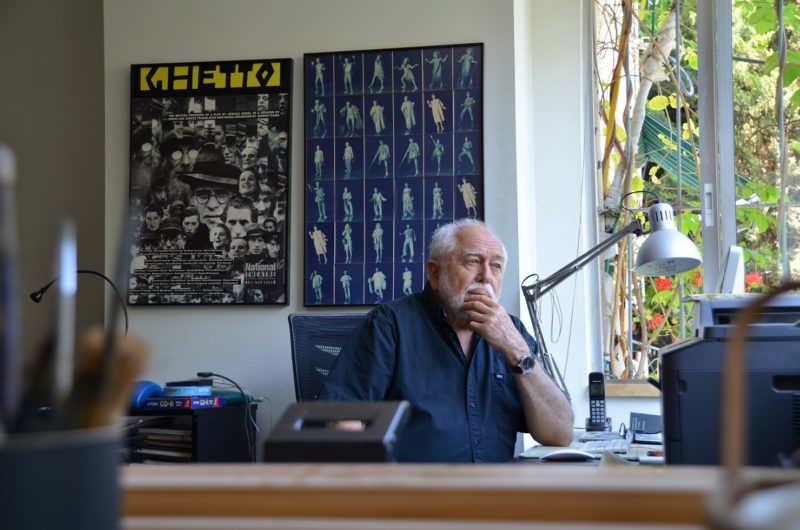
Joshua Sobol
“The play “Ghetto” was written following a suggestion made by a good friend of mine – that I would write a script for a TV program about the activities of underground youth movements in the ghettos during the Holocaust. While I was doing my preliminary research, I found out there was a theater in Vilnius Ghetto where plays were staged by actors who lived in the ghetto. It was a fascinating discovery for me. I interviewed a Vilnius Ghetto survivor about the significance of this theater, and she told me that after a grueling day of work in the ghetto, the theater offered them the chance to wear their best clothes and go to watch a play. This was their way of clinging to sanity when the whole world around them was falling apart.
Writing the play, I was especially interested in the significance of theater as an art in a human community living under a constant threat of extermination. The ghetto theater served as a means of preserving the human value of the whole community. Theater can subsist on minimal resources. You need nothing more than the human body and the human voice to turn the raw materials of reality into art, thus bestowing people with the power to withstand the efforts to crush them and make them regard themselves as common beasts. Faced with this forced brutalization, the theater enabled the ghetto residents to reclaim their humanity. In my opinion, one of the main messages of the play is the immense value of life, even in the very strong presence of death. Setting up a theater in the heart of darkness is defying death and refusing to succumb to its oppressive power. As if saying, as long as we are not dead, we shall live life to the fullest.
The play raises the acute moral question of cooperation with the Nazis. Jacob Gens, the protagonist, chief of the Jewish police and chairman of the Judenrat in Vilnius Ghetto, believed some cooperation with the Nazis was a necessity – one that would gain precious time and save many Jewish lives until Vilnius was liberated by the Red Army. When the Nazis demanded children, Gens – a strong man – persuaded them to take elders instead, arguing the children should grow up and serve as an efficient work force for the benefit the Reich. Since the German Reich was due to stand a thousand years, he said, it was worthwhile spearing the young lives in return for the old ones. He knew sending the elders to their death was immoral, but at the same time saw he was part of a reality which was beyond moral considerations. He realized the Jewish people was fighting for its very biologic existence, and at war – moral takes second place to the more important value of defeating the tyrant and stopping the genocide.
Are you allowed to cooperate with the Nazis? That is the deep question the play raises. What do you do when you have to choose between two evils? Can you sacrifice old people for the sake of children? Would you sacrifice the life of others to save your own? Every ghetto resident had to face this dilemma. Every escapee doomed the rest of his family members, or labor party members. The price tag was clear. I have talked with people who went through this experience, and they said they carried the burden of guilt their whole lives.
What would I do, if I was faced with a similar choice? I don’t know. I really don’t know. Each decision is made at a fateful moment, with its own unique, unrepeated circumstances, and therefore I don’t think it is possible to employ the regular set of legal tools and terms with regard to a person who had to cope with such a radical existential situation. Those rules and terms were simply not part of that forced reality the Nazis had created. The first question you must ask is, is the world I live in a humane one, or a world where survival is the only law?
Hayyah, an actress in the ghetto theater, faces the same dilemma in my play. Although she knows her escape would lead to the killing all of the entire company, she still decides to run away and save her life. At the end of the play, a Nazi officer indeed executes them all, and as they lie dead on the stage, Hayyah’s song is played in the background. In the reality the Nazis had created, the price of life was death. The actors paid with their lives so that Hayyah’s song should survive for eternity.”
